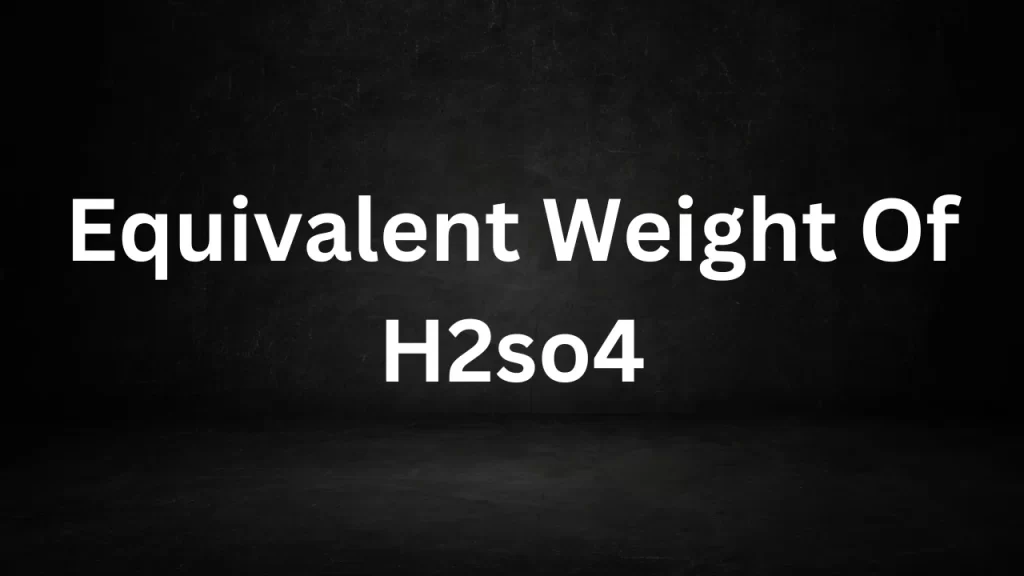Tag: Polyprotic Acid:
Equivalent Weight Of H2so4
Equivalent Weight Of H2so4: The equivalent weight of a compound depends on its chemical formula and the specific reaction it is involved in. To calculate the equivalent weight of sulfuric acid (H₂SO₄) for a particular reaction, you need to know the reaction and the role of sulfuric acid in that reaction.
The equivalent weight is used in stoichiometry to represent the amount of a substance that provides or consumes one mole of electrons or reacts with one mole of a specific reagent. It is often used in acid-base reactions, redox reactions, and other chemical processes.
For sulfuric acid (H₂SO₄), it is essential to consider whether it is acting as a monoprotic, diprotic, or polyprotic acid in the reaction.

Equivalent Weight Of H2so4
1. Monoprotic Acid: If sulfuric acid is acting as a monoprotic acid (donating one hydrogen ion, H⁺), its equivalent weight is equal to its molar mass divided by the number of moles of H⁺ ions it donates. The molar mass of H₂SO₄ is approximately 98.08 g/mol.
Equivalent Weight (monoprotic H₂SO₄) = Molar Mass (H₂SO₄) / 1 (since it donates one H⁺ ion) Equivalent Weight (monoprotic H₂SO₄) ≈ 98.08 g/mol
2. Diprotic Acid: If sulfuric acid is acting as a diprotic acid (donating two hydrogen ions, H⁺), its equivalent weight is calculated by dividing its molar mass by the number of moles of H⁺ ions it donates, which is 2.
Equivalent Weight (diprotic H₂SO₄) = Molar Mass (H₂SO₄) / 2 (since it donates two H⁺ ions) Equivalent Weight (diprotic H₂SO₄) ≈ 98.08 g/mol / 2 ≈ 49.04 g/mol
In this case, the equivalent weight of diprotic sulfuric acid is approximately 49.04 g/mol.
3. Polyprotic Acid: Sulfuric acid can also act as a polyprotic acid in certain reactions, donating more than two hydrogen ions. In such cases, the equivalent weight would be adjusted accordingly based on the number of moles of H⁺ ions donated.
It’s important to note that the equivalent weight is a specific value for a particular reaction, and it may vary depending on the context of the chemical reaction in which sulfuric acid is involved. To determine the appropriate equivalent weight for a given reaction, you should consider the stoichiometry and the specific role of sulfuric acid in that reaction.
Read More
- Molecular Weight Of Carbon
- Molecular Weight Of Hydrogen
- Molecular Weight Of Urea
- Molecular Mass Of Urea
- Molecular Mass Of Hydrogen
Frequently Asked Questions (FAQs) Equivalent Weight Of H2so4
1. What is the equivalent weight of sulfuric acid (H₂SO₄)?
The equivalent weight of sulfuric acid (H₂SO₄) depends on the specific reaction and the number of moles of hydrogen ions (H⁺) it donates. For H₂SO₄ acting as a monoprotic acid, its equivalent weight is approximately 98.08 g/mol. However, it can vary based on the reaction and the role it plays.
2. What is the significance of the equivalent weight in chemistry?
The equivalent weight is a crucial concept in stoichiometry and is used to quantify the amount of a substance that provides or consumes one mole of electrons or reacts with one mole of a specific reagent. It simplifies chemical calculations and is particularly important in acid-base reactions, redox reactions, and titrations.
3. How is the equivalent weight of H₂SO₄ calculated when it acts as a monoprotic acid?
When H₂SO₄ acts as a monoprotic acid, its equivalent weight is determined by dividing its molar mass by the number of moles of hydrogen ions (H⁺) it donates, which is 1. The molar mass of H₂SO₄ is approximately 98.08 g/mol, so the equivalent weight for monoprotic H₂SO₄ is around 98.08 g/mol.
4. Can sulfuric acid act as a diprotic acid, and how is its equivalent weight calculated in such cases?
Yes, sulfuric acid can act as a diprotic acid, donating two hydrogen ions (H⁺) in certain reactions. In such cases, its equivalent weight is calculated by dividing its molar mass by the number of moles of H⁺ ions it donates, which is 2. The equivalent weight for diprotic H₂SO₄ is approximately 49.04 g/mol.
5. Does sulfuric acid ever act as a polyprotic acid, and how does that affect its equivalent weight?
Sulfuric acid can act as a polyprotic acid, donating more than two hydrogen ions (H⁺) in specific reactions. In polyprotic scenarios, the equivalent weight is adjusted based on the number of moles of H⁺ ions donated in that particular reaction. The equivalent weight varies depending on the reaction’s stoichiometry and the specific role of sulfuric acid.